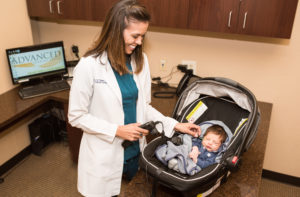 Did you know that there is more than one way to screen for hearing loss? Often, when the term “hearing test” is used, people picture the test in which an individual wears headphones, and indicates whether or not they can hear various sounds that are emitted through the headset. Other tests are available, however, and can be used for different people and/or situations. One such test is an oto-acoustic emission test.
Did you know that there is more than one way to screen for hearing loss? Often, when the term “hearing test” is used, people picture the test in which an individual wears headphones, and indicates whether or not they can hear various sounds that are emitted through the headset. Other tests are available, however, and can be used for different people and/or situations. One such test is an oto-acoustic emission test.
Oto-acoustic Emission Test
One test that is perhaps less well-known, but can be very useful in diagnosing hearing loss, is the Oto-acoustic Emissions (OAE) Test. Within the inner ear, or cochlea, there are tiny hairs called cilia. In a normal ear, these hairs vibrate when exposed to sound, producing quiet sounds of their own called evoked oto-acoustic emissions (EOAEs). They can also make sounds without an acoustic stimulus, producing spontaneous oto-acoustic emissions (SOAEs). The OAE Test measures these sounds.
If OAEs are faint or non-existent, this indicates that the cochlea may be damaged. Another possibility is that there is a blockage within the ear, preventing sound from reaching the inner ear. In either case, hearing loss can occur and can easily be diagnosed by this test.
Benefits of OAE testing
Using the Oto-acoustic Emissions Test to screen for hearing loss is especially useful with infants or individuals with disabilities. This is because the test can be done without requiring any response from the person being tested. A small probe is simply inserted into the ear and measures the OAEs. The results are then displayed on a screen and can be interpreted by the audiologist who is administering the test.
Since the OAE Test is easy and painless to administer, it is often done on newborns, sometimes before they even leave the hospital. They can be at rest or even sleeping during the test. Correct interpretation of the results can lead to early diagnosis of hearing disorders that could affect other areas of development, such as speech, if left untreated.
Early detection is important
If you believe you, or a loved one may have hearing loss, get a hearing test as soon as possible. Early detection of hearing problems can lead to the possibility of more treatment options. In some cases, it can prevent other difficulties that result from hearing loss. Take control of your hearing health and make an appointment with an audiologist today.

